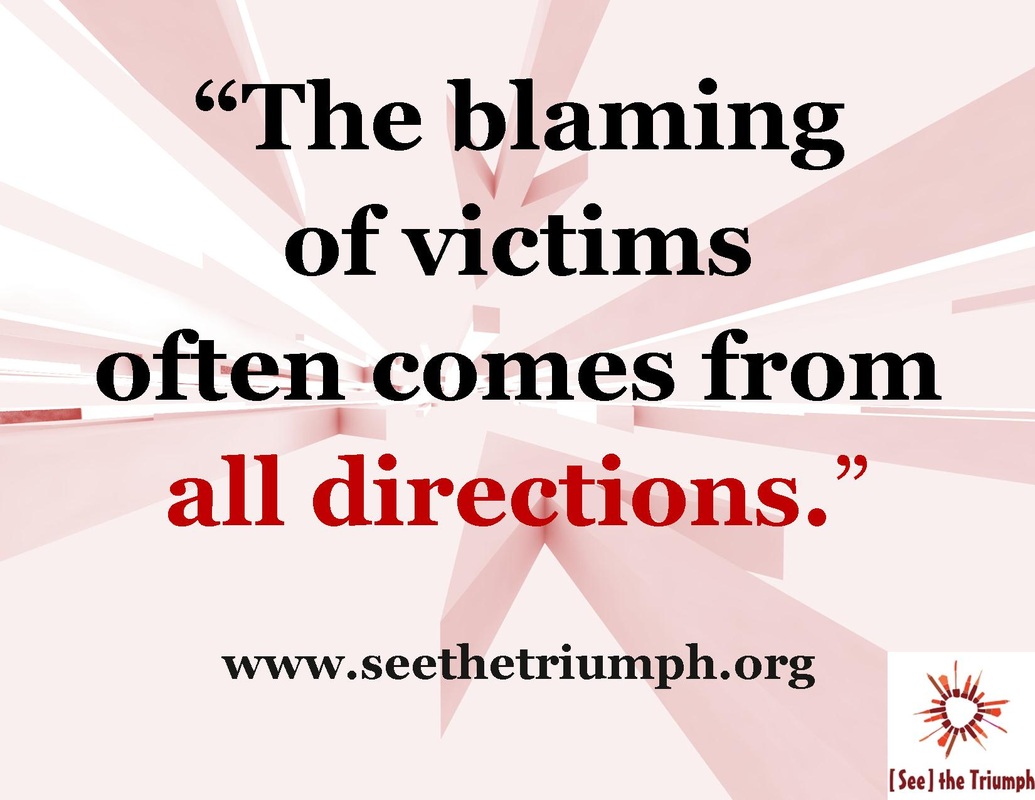|
11/25/2013 Victim Blaming and StigmaBy Christine Murray, See the Triumph Co-Founder
Recently, we launched our Causes pledge to tell survivors of intimate partner violence: “It’s not your fault.” We still invite you to take the pledge and add your name to the hundreds of others who have already done so. The more people who take the pledge, the stronger the message will be that victims are never to blame for the abuse they experience. In our research, victim blaming has consistently come up as one aspect of the broader stigma surrounding intimate partner violence. It seems that many survivors have been made to feel that they are somehow responsible for their abuse, whether that blame comes from their perpetrators, people in their personal networks, and even the professionals they reach out to. A 2011 research study published in the journal Feminist Criminology showed that the media often perpetuates victim-blaming attitudes, too.(1) In this study, the researchers reviewed newspaper stories on murders of females by their intimate partners over a six-year time-frame in North Carolina. In 11% of the stories reviewed, the stories used direct victim-blaming language by reporting on steps the women failed to take to protect themselves (e.g., leaving or seeking legal protections). In addition, 14% of the stories reviewed used more indirect ways of blaming victims, such as by referring to their drug or alcohol use and/or mental health issues. It seems the blaming of victims often comes from all directions. So why does victim-blaming matter? In a recent article on the Refinery29 web-site, author Jessica Goldstein said, “As long as we live in a culture that blames victims for ‘not leaving’ instead of holding perpetrators of violence accountable for committing such atrocities in the first place, a critical mass of victims won’t feel safe and supported enough to come forward with their stories.” Think about it. If you felt that you were responsible for some bad outcome happening to you, wouldn’t you feel embarrassed and less likely to reach out for help? Would you perhaps feel that you should be ashamed and don’t deserve to be helped because you somehow brought the situation on yourself? The weight of the blame and stigma would likely have a profound impact on how deserving you felt of support from others. The stigma surrounding intimate partner violence is very real, and we invite you to join us in working together to end it. Taking the pledge to tell survivors, “It’s not your fault,” is one step, and we’ll always welcome more of your ideas on other steps that we can take to end the damaging stigma that prevents survivors from getting the support they need. Resource: (1) Richards, T. N., Gillespie, L. K., & Smith, M. D. (2011). Exploring news coverage of femicide: Does reporting the news add insult to injury. Feminist Criminology, 6, 178-202. Comments are closed.
|
Archives
July 2024
CategoriesAll About Intimate Partner Violence About Intimate Partner Violence Advocacy Ambassadors Children Churches College Campuses Cultural Issues Domestic Violence Awareness Month Financial Recovery How To Help A Friend Human Rights Human-rights Immigrants International Media Overcoming Past Abuse Overcoming-past-abuse Parenting Prevention Resources For Survivors Safe Relationships Following Abuse Schools Selfcare Self-care Sexual Assault Sexuality Social Justice Social-justice Stigma Supporting Survivors Survivor Quotes Survivor-quotes Survivor Stories Teen Dating Violence Trafficking Transformative-approaches |
Search by typing & pressing enter



 RSS Feed
RSS Feed